新概念英语第四册第二十三单元课文词组拓展(1)
- 格式:doc
- 大小:25.50 KB
- 文档页数:1
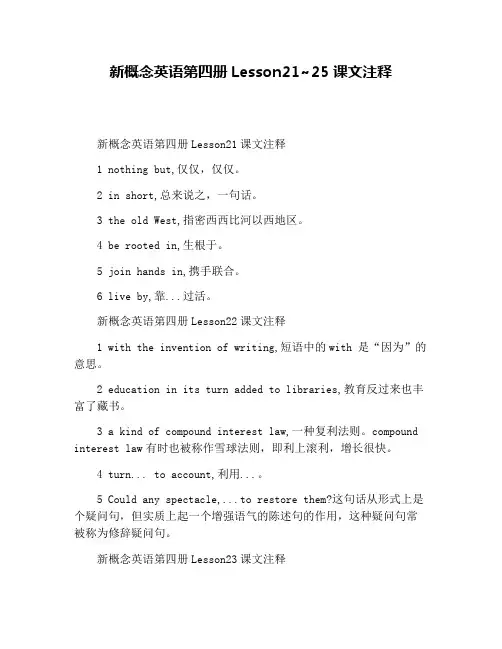
新概念英语第四册Lesson21~25课文注释新概念英语第四册Lesson21课文注释1 nothing but,仅仅,仅仅。
2 in short,总来说之,一句话。
3 the old West,指密西西比河以西地区。
4 be rooted in,生根于。
5 join hands in,携手联合。
6 live by,靠...过活。
新概念英语第四册Lesson22课文注释1 with the invention of writing,短语中的with 是“因为”的意思。
2 education in its turn added to libraries,教育反过来也丰富了藏书。
3 a kind of compound interest law,一种复利法则。
compound interest law有时也被称作雪球法则,即利上滚利,增长很快。
4 turn... to account,利用...。
5 Could any spectacle,...to restore them?这句话从形式上是个疑问句,但实质上起一个增强语气的陈述句的作用,这种疑问句常被称为修辞疑问句。
新概念英语第四册Lesson23课文注释1 keep company with,陪伴着....。
2 The currents of air that the walls of the ship direct upwards,沿着船体上升的气流。
3 steel-like muscles,that are a good part of the weightof the bird,句中以that引导的从句是一个非限定性定语从句,修饰muscles,但用that引导非限定性定语从句是很罕见的。
4 in hghest measure,水准的。
5 It tires no nor does it boast of its power,but belongsto the air,travelling it may be .. adverse.句中的tires not 是古英语或诗歌中使用的句式。
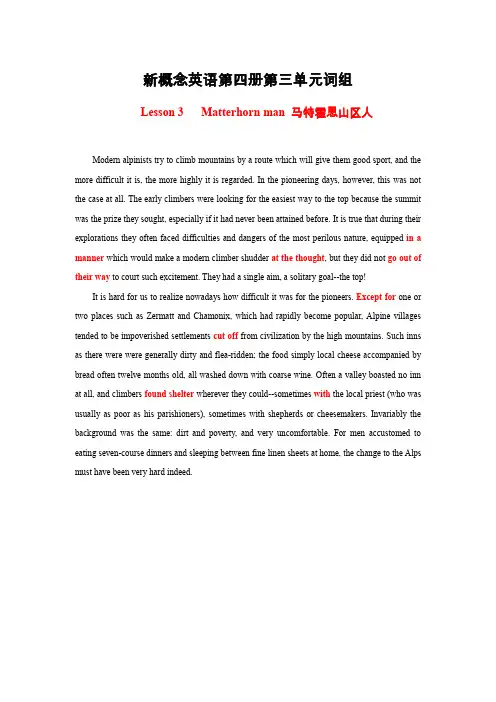
新概念英语第四册第三单元词组Lesson 3 Matterhorn man 马特霍恩山区人Modern alpinists try to climb mountains by a route which will give them good sport, and the more difficult it is, the more highly it is regarded. In the pioneering days, however, this was not the case at all. The early climbers were looking for the easiest way to the top because the summit was the prize they sought, especially if it had never been attained before.It is true that during their explorations they often faced difficulties and dangers of the most perilous nature, equipped in a manner which would make a modern climber shudder at the thought, but they did not go out of their way to court such excitement. They had a single aim, a solitary goal--the top!It is hard for us to realize nowadays how difficult it was for the pioneers. Except for one or two places such as Zermatt and Chamonix, which had rapidly become popular, Alpine villages tended to be impoverished settlements cut off from civilization by the high mountains. Such inns as there were were generally dirty and flea-ridden; the food simply local cheese accompanied by bread often twelve months old, all washed down with coarse wine. Often a valley boasted no inn at all, and climbers found shelter wherever they could--sometimes with the local priest (who was usually as poor as his parishioners), sometimes with shepherds or cheesemakers. Invariably the background was the same: dirt and poverty, and very uncomfortable. For men accustomed to eating seven-course dinners and sleeping between fine linen sheets at home, the change to the Alps must have been very hard indeed.。
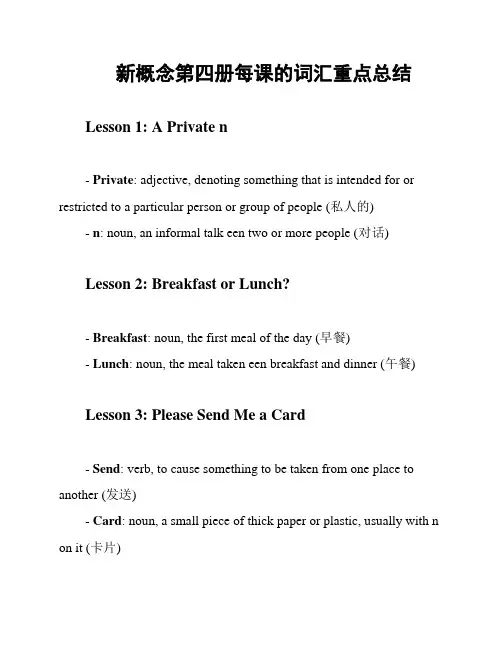
新概念第四册每课的词汇重点总结Lesson 1: A Private n- Private: adjective, denoting something that is intended for or restricted to a particular person or group of people (私人的) - n: noun, an informal talk een two or more people (对话)Lesson 2: Breakfast or Lunch?- Breakfast: noun, the first meal of the day (早餐)- Lunch: noun, the meal taken een breakfast and dinner (午餐)Lesson 3: Please Send Me a Card- Send: verb, to cause something to be taken from one place to another (发送)- Card: noun, a small piece of thick paper or plastic, usually with n on it (卡片)Lesson 4: An Important Letter- Important: adjective, of great significance or value (重要的)- Letter: noun, a written message from one person to another (信件) Lesson 5: Aboard a Train- Aboard: adverb, on a train, ship, aircraft, etc. (在车上)Lesson 6:funny Story- Funny: adjective, causing laughter or amusement (有趣的)- Story: noun, a written or spoken account of events, experiences,or the like (故事)Lesson 7: A Caring Doctor- Caring: adjective, showing kindness, understanding, or concern for other people (关心的)- Doctor: noun, a person who is qualified to practice medicine (医生)Lesson 8: Noisy Neighbors- Noisy: adjective, making a lot of noise (喧闹的)- Neighbor: noun, a person who lives in the same building or area as another person (邻居)Lesson 9: An Accident- Accident: noun, an unexpected event that causes damage, injury, or death (事故)Lesson 10: Alone at Home- Alone: adjective, without anyone else present (独自的)- Home: noun, the place where one lives, especially as a member of a family or household (家)Lesson 11: A False Report- False: adjective, not true or correct (错误的)- Report: noun, a written or spoken statement about something that has happened (报告)Lesson 12: The Channel Tunnel- Channel Tunnel: noun, a tunnel beneath the English Channel, connecting England and France (英法海底隧道)Lesson 13: The Olympic Games- Olympic Games: noun, a sports event held every four years, with participants from all over the world (奥运会)Lesson 14: The Vaccine- Vaccine: noun, a medical substance given to people to prevent (脊髓灰质炎疫苗)Lesson 15: The Moon Landing- Moon Landing: noun, the event of an aircraft landing on the moon (登月)Lesson 16: A Traffic Accident- Traffic Accident: noun, an unexpected event that involves damage, injury, or death due to traffic (交通事故)Lesson 17: Life on Mars?- Life: noun, the state of being alive (生命)- Mars: noun, the fourth from the sun, known as the "Red " (火星)Lesson 18: A Trip to Mars- Trip: noun, a journey to a place, especially a long one (旅行)Lesson 19: The World Cup- World Cup: noun, a sports event held every four years, with participants from all over the world (世界杯)Lesson 20: A Bigger Problem- Bigger: adjective, of greater size, amount, or extent (更大的)Lesson 21: Richard's Dilemma- Dilemma: noun, a n in which it is very difficult to choose what to do, because all the choices are equally unfavorable (困境)Lesson 22: False Pretense- False Pretense: noun, a n where someone pretends to be something or someone they are not (伪装)Lesson 23: No Parking- Parking: noun, the act of ping a vehicle and leaving it unattended in a place where it will not cause a n (停车)Lesson 24: At the Post Office- Post Office: noun, a government agency that provides mail and package delivery services (邮局)。
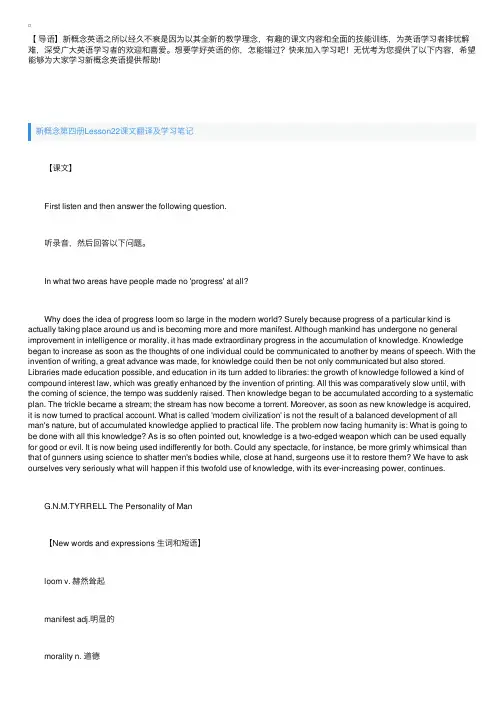
【导语】新概念英语之所以经久不衰是因为以其全新的教学理念,有趣的课⽂内容和全⾯的技能训练,为英语学习者排忧解难,深受⼴⼤英语学习者的欢迎和喜爱。
想要学好英语的你,怎能错过?快来加⼊学习吧!⽆忧考为您提供了以下内容,希望能够为⼤家学习新概念英语提供帮助!新概念第四册Lesson22课⽂翻译及学习笔记 【课⽂】 First listen and then answer the following question. 听录⾳,然后回答以下问题。
In what two areas have people made no 'progress' at all? Why does the idea of progress loom so large in the modern world? Surely because progress of a particular kind is actually taking place around us and is becoming more and more manifest. Although mankind has undergone no general improvement in intelligence or morality, it has made extraordinary progress in the accumulation of knowledge. Knowledge began to increase as soon as the thoughts of one individual could be communicated to another by means of speech. With the invention of writing, a great advance was made, for knowledge could then be not only communicated but also stored. Libraries made education possible, and education in its turn added to libraries: the growth of knowledge followed a kind of compound interest law, which was greatly enhanced by the invention of printing. All this was comparatively slow until, with the coming of science, the tempo was suddenly raised. Then knowledge began to be accumulated according to a systematic plan. The trickle became a stream; the stream has now become a torrent. Moreover, as soon as new knowledge is acquired, it is now turned to practical account. What is called 'modern civilization' is not the result of a balanced development of all man's nature, but of accumulated knowledge applied to practical life. The problem now facing humanity is: What is going to be done with all this knowledge? As is so often pointed out, knowledge is a two-edged weapon which can be used equally for good or evil. It is now being used indifferently for both. Could any spectacle, for instance, be more grimly whimsical than that of gunners using science to shatter men's bodies while, close at hand, surgeons use it to restore them? We have to ask ourselves very seriously what will happen if this twofold use of knowledge, with its ever-increasing power, continues. G.N.M.TYRRELL The Personality of Man 【New words and expressions ⽣词和短语】 loom v. 赫然耸起 manifest adj.明显的 morality n. 道德 communicate v. 交流,交际 compound adj. 复合的 enhance v. 增进 tempo n. 速率 trickle n. 涓涓细流 torrent n. 滔滔洪流 humanity n. ⼈类 indifferently adv. 不在乎地 grimly adv. 可怖地 whimsical adj. 怪诞的 shatter v. 毁坏 twofold adj. 双重的 【课⽂注释】 1.loom,隐现(常令⼈⽣畏);即将发⽣。
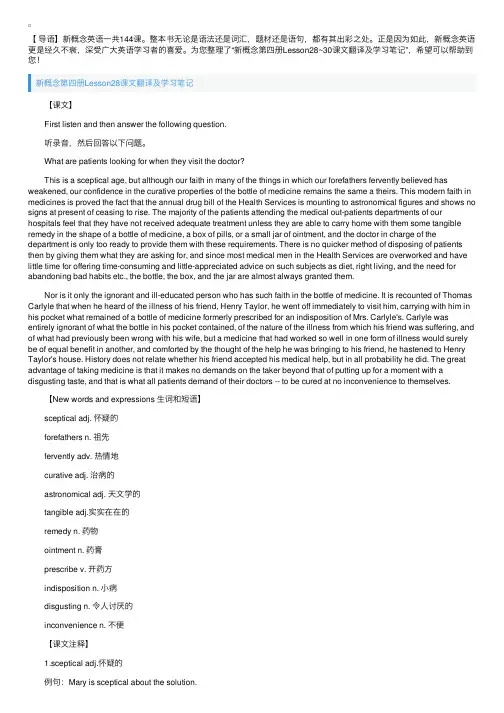
【导语】新概念英语⼀共144课。
整本书⽆论是语法还是词汇,题材还是语句,都有其出彩之处。
正是因为如此,新概念英语更是经久不衰,深受⼴⼤英语学习者的喜爱。
为您整理了“新概念第四册Lesson28~30课⽂翻译及学习笔记”,希望可以帮助到您!新概念第四册Lesson28课⽂翻译及学习笔记 【课⽂】 First listen and then answer the following question. 听录⾳,然后回答以下问题。
What are patients looking for when they visit the doctor? This is a sceptical age, but although our faith in many of the things in which our forefathers fervently believed has weakened, our confidence in the curative properties of the bottle of medicine remains the same a theirs. This modern faith in medicines is proved the fact that the annual drug bill of the Health Services is mounting to astronomical figures and shows no signs at present of ceasing to rise. The majority of the patients attending the medical out-patients departments of our hospitals feel that they have not received adequate treatment unless they are able to carry home with them some tangible remedy in the shape of a bottle of medicine, a box of pills, or a small jar of ointment, and the doctor in charge of the department is only too ready to provide them with these requirements. There is no quicker method of disposing of patients then by giving them what they are asking for, and since most medical men in the Health Services are overworked and have little time for offering time-consuming and little-appreciated advice on such subjects as diet, right living, and the need for abandoning bad habits etc., the bottle, the box, and the jar are almost always granted them. Nor is it only the ignorant and ill-educated person who has such faith in the bottle of medicine. It is recounted of Thomas Carlyle that when he heard of the illness of his friend, Henry Taylor, he went off immediately to visit him, carrying with him in his pocket what remained of a bottle of medicine formerly prescribed for an indisposition of Mrs. Carlyle's. Carlyle was entirely ignorant of what the bottle in his pocket contained, of the nature of the illness from which his friend was suffering, and of what had previously been wrong with his wife, but a medicine that had worked so well in one form of illness would surely be of equal benefit in another, and comforted by the thought of the help he was bringing to his friend, he hastened to Henry Taylor's house. History does not relate whether his friend accepted his medical help, but in all probability he did. The great advantage of taking medicine is that it makes no demands on the taker beyond that of putting up for a moment with a disgusting taste, and that is what all patients demand of their doctors -- to be cured at no inconvenience to themselves. 【New words and expressions ⽣词和短语】 sceptical adj. 怀疑的 forefathers n. 祖先 fervently adv. 热情地 curative adj. 治病的 astronomical adj. 天⽂学的 tangible adj.实实在在的 remedy n. 药物 ointment n. 药膏 prescribe v. 开药⽅ indisposition n. ⼩病 disgusting n. 令⼈讨厌的 inconvenience n. 不便 【课⽂注释】 1.sceptical adj.怀疑的 例句:Mary is sceptical about the solution. 玛丽对这个解决办法表⽰怀疑。
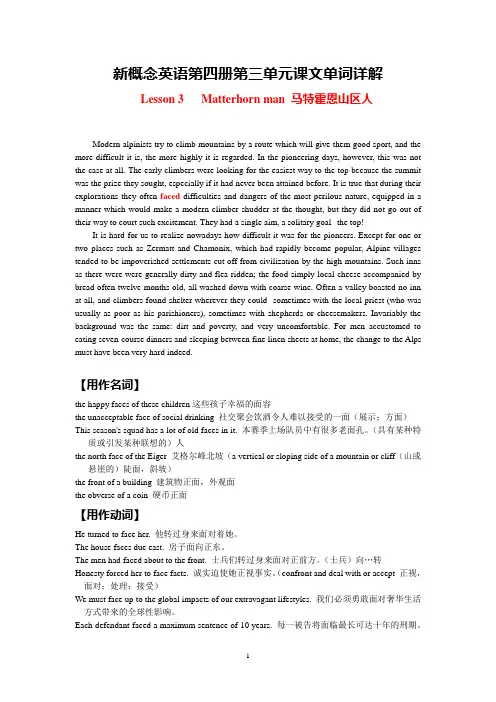
新概念英语第四册第三单元课文单词详解Lesson 3 Matterhorn man 马特霍恩山区人Modern alpinists try to climb mountains by a route which will give them good sport, and the more difficult it is, the more highly it is regarded. In the pioneering days, however, this was not the case at all. The early climbers were looking for the easiest way to the top because the summit was the prize they sought, especially if it had never been attained before. It is true that during their explorations they often faced difficulties and dangers of the most perilous nature, equipped in a manner which would make a modern climber shudder at the thought, but they did not go out of their way to court such excitement. They had a single aim, a solitary goal--the top!It is hard for us to realize nowadays how difficult it was for the pioneers. Except for one or two places such as Zermatt and Chamonix, which had rapidly become popular, Alpine villages tended to be impoverished settlements cut off from civilization by the high mountains. Such inns as there were were generally dirty and flea-ridden; the food simply local cheese accompanied by bread often twelve months old, all washed down with coarse wine. Often a valley boasted no inn at all, and climbers found shelter wherever they could--sometimes with the local priest (who was usually as poor as his parishioners), sometimes with shepherds or cheesemakers. Invariably the background was the same: dirt and poverty, and very uncomfortable. For men accustomed to eating seven-course dinners and sleeping between fine linen sheets at home, the change to the Alps must have been very hard indeed.【用作名词】the happy faces of these children这些孩子幸福的面容the unacceptable face of social drinking 社交聚会饮酒令人难以接受的一面(展示;方面)This season's squad has a lot of old faces in it. 本赛季上场队员中有很多老面孔。
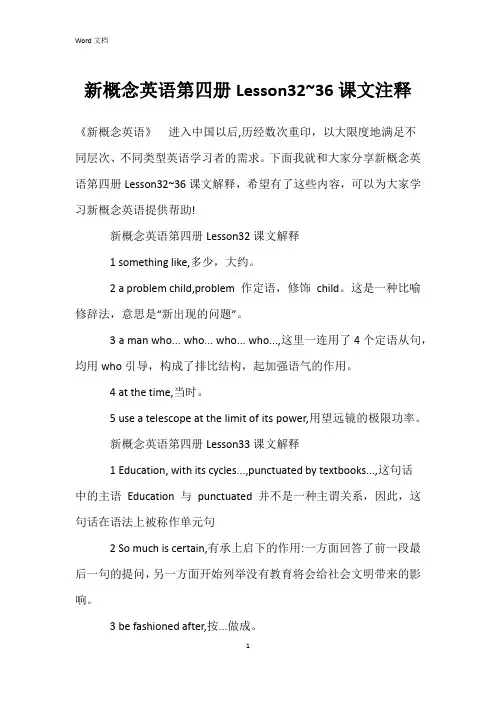
新概念英语第四册Lesson32~36课文注释《新概念英语》进入中国以后,历经数次重印,以大限度地满足不同层次、不同类型英语学习者的需求。
下面我就和大家分享新概念英语第四册Lesson32~36课文解释,希望有了这些内容,可以为大家学习新概念英语提供帮助!新概念英语第四册Lesson32课文解释1 something like,多少,大约。
2 a problem child,problem 作定语,修饰child。
这是一种比喻修辞法,意思是“新出现的问题”。
3 a man who... who... who... who...,这里一连用了4个定语从句,均用who引导,构成了排比结构,起加强语气的作用。
4 at the time,当时。
5 use a telescope at the limit of its power,用望远镜的极限功率。
新概念英语第四册Lesson33课文解释1 Education, with its cycles...,punctuated by textbooks...,这句话中的主语Education 与punctuated 并不是一种主谓关系,因此,这句话在语法上被称作单元句2 So much is certain,有承上启下的作用:一方面回答了前一段最后一句的提问,另一方面开始列举没有教育将会给社会文明带来的影响。
3 be fashioned after,按...做成。
4 without a s cript,没有文字的。
新概念英语第四册Lesson34课文解释1 on the part of,在...一边。
2 they have brought this on themselves,他们是咎由自取。
3 stand up to,经得起。
4 face up to,正视。
新概念英语第四册Lesson35课文解释1 the comparable speed from the Moon,从月球出发的相应的速度,这里是指摆脱月球引力所需达到的速度。
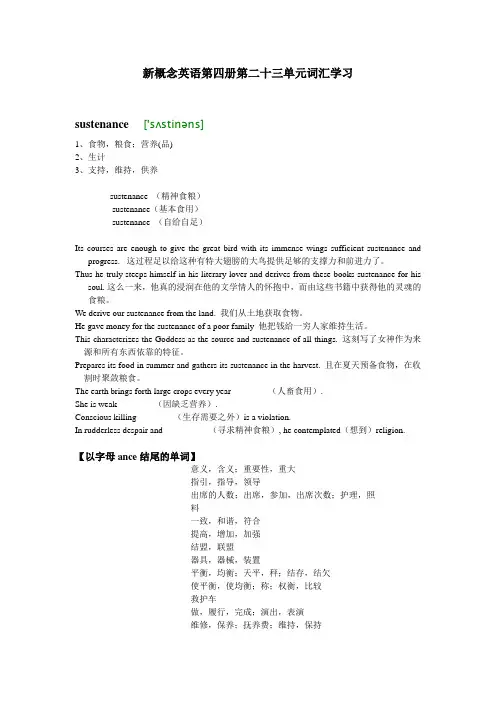
新概念英语第四册第二十三单元词汇学习sustenance ['sʌstinəns]1、食物,粮食;营养(品)2、生计3、支持,维持,供养________sustenance (精神食粮)________ sustenance(基本食用)________ sustenance (自给自足)Its courses are enough to give the great bird with its immense wings sufficient sustenance and progress. 这过程足以给这种有特大翅膀的大鸟提供足够的支撑力和前进力了。
Thus he truly steeps himself in his literary lover and derives from these books sustenance for his soul. 这么一来,他真的浸润在他的文学情人的怀抱中,而由这些书籍中获得他的灵魂的食粮。
We derive our sustenance from the land. 我们从土地获取食物。
He gave money for the sustenance of a poor family 他把钱给一穷人家维持生活。
This characterizes the Goddess as the source and sustenance of all things. 这刻写了女神作为来源和所有东西依靠的特征。
Prepares its food in summer and gathers its sustenance in the harvest. 且在夏天预备食物,在收割时聚敛粮食。
The earth brings forth large crops every year ________(人畜食用).She is weak ________(因缺乏营养).Conscious killing ________(生存需要之外)is a violation.In rudderless despair and __________(寻求精神食粮), he contemplated(想到)religion.【以字母ance结尾的单词】意义,含义;重要性,重大指引,指导,领导出席的人数;出席,参加,出席次数;护理,照料一致,和谐,符合提高,增加,加强结盟,联盟器具,器械,装置平衡,均衡;天平,秤;结存,结欠使平衡,使均衡;称;权衡,比较救护车做,履行,完成;演出,表演维修,保养;抚养费;维持,保持财政,金融;(常pl.)财源,资金,财务状况为……提供资金,为……筹集资金出现,显露,露面;外观,外貌,外表宽容,容忍;忍耐(力)无知,愚昧忍耐(力),持久(力),耐久(性)保险,保险费令人讨厌的东西(或状况、行为),讨厌的人相识的人,熟人;认识,相识,了解接受,接纳;赞同,承认;容忍物质;实质;大意,要旨;根据,理由反抗,抵制;抵抗力,抵抗性;阻力,电阻帮助,援助环境,条件,形势;(pl.)境况,经济状况例子,实例,事例津贴,补贴,零用钱。
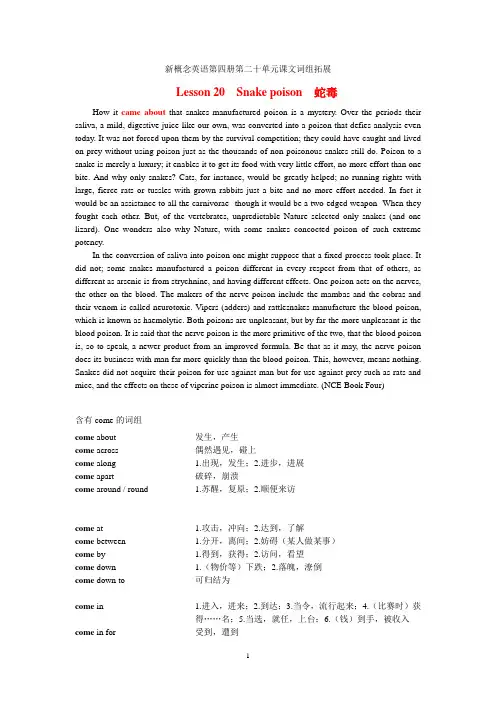
新概念英语第四册第二十单元课文词组拓展Lesson 20 Snake poison 蛇毒How it came about that snakes manufactured poison is a mystery. Over the periods their saliva, a mild, digestive juice like our own, was converted into a poison that defies analysis even today. It was not forced upon them by the survival competition; they could have caught and lived on prey without using poison just as the thousands of non-poisonous snakes still do. Poison to a snake is merely a luxury; it enables it to get its food with very little effort, no more effort than one bite. And why only snakes? Cats, for instance, would be greatly helped; no running rights with large, fierce rats or tussles with grown rabbits just a bite and no more effort needed. In fact it would be an assistance to all the carnivorae--though it would be a two-edged weapon -When they fought each other. But, of the vertebrates, unpredictable Nature selected only snakes (and one lizard). One wonders also why Nature, with some snakes concocted poison of such extreme potency.In the conversion of saliva into poison one might suppose that a fixed process took place. It did not; some snakes manufactured a poison different in every respect from that of others, as different as arsenic is from strychnine, and having different effects. One poison acts on the nerves, the other on the blood. The makers of the nerve poison include the mambas and the cobras and their venom is called neurotoxic. Vipers (adders) and rattlesnakes manufacture the blood poison, which is known as haemolytic. Both poisons are unpleasant, but by far the more unpleasant is the blood poison. It is said that the nerve poison is the more primitive of the two, that the blood poison is, so to speak, a newer product from an improved formula. Be that as it may, the nerve poison does its business with man far more quickly than the blood poison. This, however, means nothing. Snakes did not acquire their poison for use against man but for use against prey such as rats and mice, and the effects on these of viperine poison is almost immediate. (NCE Book Four)含有come的词组come about 发生,产生come across 偶然遇见,碰上come along 1.出现,发生;2.进步,进展come apart 破碎,崩溃come around / round 1.苏醒,复原;2.顺便来访come at 1.攻击,冲向;2.达到,了解come between 1.分开,离间;2.妨碍(某人做某事)come by 1.得到,获得;2.访问,看望come down 1.(物价等)下跌;2.落魄,潦倒come down to 可归结为come in 1.进入,进来;2.到达;3.当令,流行起来;4.(比赛时)获得……名;5.当选,就任,上台;6.(钱)到手,被收入come in for 受到,遭到come into 1.进入,加入;2.开始处于;3.得到,继承come off 1.脱落,分开;2.结果,表现come on 1.(表示鼓励、催促等)快,走吧;2.进步,进展;3.发生,开始come out 1.出现,显露;2.出版,发表;3.结果是come out with 1.发表,公布;2.吐露,说出,提出;3.展出,供应come round 1.来,前来;2.绕道而来;3.重又来到;4.改变主意,回心转意;5.(风、船等)转向;6.苏醒,复元;7.让步,服从,照办come through 经历……仍活着,安然度过come to 1.苏醒;2.总数为,结果是;3.涉及,谈到come under 1.编入,归入(某一项目);2.受到,遭受(影向、支配等)come up 1.出现,发生2.走上前来come up against 突然(或意外)碰到(困难、反对等)come up for 1.升上来,升起,出现;2.出让,卖出;3.列入come up to 比得上,达到(标准等)come up with 提出,想出,提供come / go into effect实施,生效come to grief失败,遭受不幸come / get to grips搏斗起来,开始勉力对付come / get to grips搏斗起来,开始勉力对付come to a head(事情等)达到危急的关头come to life苏醒过来,开始有生气come / go into operation实施,实行,生效come into one’s own显示自身的特点(或价值)come into play开始活动,开始运转,投入使用come to one’s senses 1.恢复理性,醒悟过来;2.(昏迷后)苏醒过来come to terms妥协,和解come true(预言、期望等)实现,成为现实come to light显露,暴露come into being出现,形成come to blows动手互殴come / draw to a close 渐近结束。
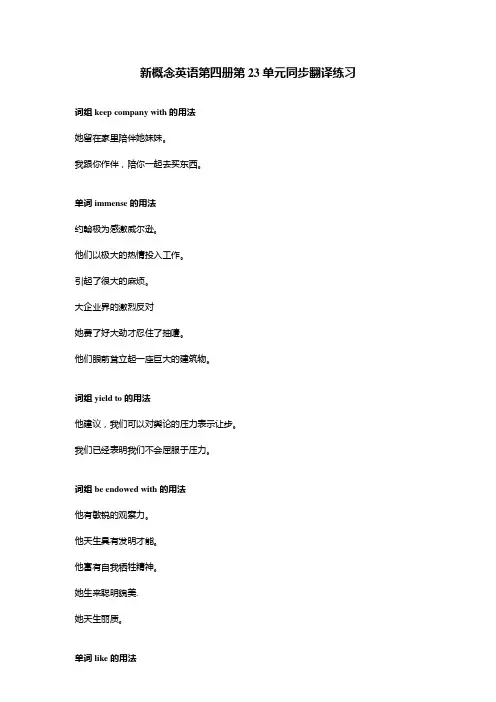
新概念英语第四册第23单元同步翻译练习
词组keep company with的用法
她留在家里陪伴她妹妹。
我跟你作伴,陪你一起去买东西。
单词immense的用法
约翰极为感激威尔逊。
他们以极大的热情投入工作。
引起了很大的麻烦。
大企业界的激烈反对
她费了好大劲才忍住了抽噎。
他们眼前耸立起一座巨大的建筑物。
词组yield to的用法
他建议,我们可以对舆论的压力表示让步。
我们已经表明我们不会屈服于压力。
词组be endowed with的用法
他有敏锐的观察力。
他天生具有发明才能。
他富有自我牺牲精神。
她生来聪明貌美.
她天生丽质。
单词like的用法
类似的问题
我一时举不出类似的例子。
我们旅行花费了五百美元,买书也花费了同样多的钱。
单词utter的用法
爱米丽亚根本看不起他。
那完全是胡说八道。
(完全的,彻底的,十足的)
她的所作所为十足就是个傻子。
她遭到断然拒绝。
(无条件的,绝对的)
词组boast of的用法
谦虚的人决不夸自己的功劳。
谁也不应当夸耀自己的学识。
上尉老是自夸阵前之勇。
我们学校图书馆以藏有好多珍本书而自豪。
他为自己上班从未迟到感到自豪。

新概念英语第四册Lesson20~23生词和短语新概念英语第四册Lesson20生词和短语saliva n. 唾液digestive adj. 助消化的defy v. 使不可能analysis n. 分析prey n. 被捕食的动物fierce adj. 凶猛的tussle n. 扭打carnivore n. 食肉动物vertebrate n. 脊椎动物lizard n. 蜥蜴concoct v. 调制potency n. 效力conversion n. 转变arsenic n. 砒霜strychnine n. 马钱子碱mamba n. 树眼镜蛇cobra n. 眼镜蛇venom n. 毒液neurotoxic adj. 毒害神经的viper n. 蝰蛇adder n. 蝮蛇rattlesnake n. 响尾蛇haemolytic adj. 溶血性的viperine adj. 毒蛇新概念英语第四册Lesson21生词和短语Supreme adj.protagonist n. 主角outlaw n. 逃犯,亡命之徒framed adj. 遭到陷害的vicious adj. 恶毒的mythology n. 神话vanished adj. 消失了的absurdly adv. 荒诞地arena n. 竞技场在encroaching adj. 逐步渗入的Indian n. 印第安人bewilder v. 使手足无措alien adj. 外来的taboo n. 戒律disinherit v. 剥夺...继承权undeclared adj. 未经宣布的hypocrisy n. 伪善chicanery n. 诈骗impending adj. 迫近的,近在眉睫的immolation n. 杀戮code n. 准则新概念英语第四册Lesson22生词和短语loom v. 赫然耸起manifest adj.明显的morality n. 道德communicate v. 交流,交际compound adj. 复合的enhance v. 增进tempo n. 速率trickle n. 涓涓细流torrent n. 滔滔洪流humanity n. 人类indifferently adv. 不在乎地grimly adv. 可怖地whimsical adj. 怪诞的shatter v. 毁坏twofold adj. 双重的新概念英语第四册Lesson23生词和短语albatross n. 信天翁sustenance n. 支撑力glider n. 滑翔者harness v. 利用endow v. 赋有ply v. 持续地供给gale n. 大风partridge n. 鹧鸪like adj. 类似的propulsion n. 推动力utter adj. 完全的slip v. 滑行adverse adj. 逆的,相反的omen n. 预兆。
新概念英语第四册课文详解L1-25Lesson 1 Finding fossil man第一课发现化石人by ROBIN PLACEfrom Finding fossil man1-1. We can read of things that happened 5,000 years ago in the Near East, where people first learned to write.【译文】我们能读到五千年前近东发生之事,那里的人最先学会了书写。
【单词和短语】read:此处为不及物动词,意为“读到,获悉”(to find out information from books,newspapers etc.),后接of或about,例如:He reads about the war. 他读到关于战争的消息。
Did you read of their accident in the newspapers?你在报上看到他们遭遇意外事故的消息了么?5,000 years:五千年。
另学习millennium,意为“一千年”,复数为millennia。
5,000 years即为5 millennia。
the Near East:近东,指地中海东部沿岸地区,包括亚洲西南部和非洲东北部,有时还包括巴尔干半岛。
1-2. But there are some parts of the world where even now people cannot write. 【译文】但时至今日世上某些地方的人还不会书写。
【单词和短语】even now:此处意为“甚至到现在”,例如:Even now he won’t believe me. 他甚至到现在还不相信我。
even now另有两解,一为“就在此刻”,例如:Perhaps even now the time has arrived.也许正是此刻时机来到了。
新概念英语第四册第二十三单元课文原文Lesson 23 Bird flight 鸟的飞行方法No two sorts of birds practise quite the same sort of flight; the varieties are infinite, but two classes may be roughly seen. Any ship that crosses the Pacific is accompanied for many days by the smaller albatross, which may keep company with the vessel for an hour without visible or more than occasional movement of wing. The currents of air that the walls of the ship direct upwards, as well as in the line of its course are enough to give the great bird with its immense wings sufficient sustenance and progress. The albatross is the king of the gliders, the class of fliers which harness the air to their purpose, but must yield to its opposition. In the contrary school the duck is supreme. It comes nearer to t he engines with which man has 'conquered' the air, as he boasts. Duck, and like them the pigeons, are endowed with steel-like muscles, that are a good part of the weight of the bird, and these will ply the short wings with irresistible power that they can bore for long distances through an opposite gale before exhaustion follows. Their humbler followers, such as partridges, have a like power of strong propulsion, but soon tire. You may pick them up in utter exhaustion, if wind over the sea has driven them to a long journey. The swallow shares the virtues of both schools in highest measure. It tires not nor does it boast of its power; but belongs to the air, traveling it may be six thousand miles to and from its northern nesting home feeding its flown young as it flies and slipping through a medium that seems to help its passage even when the wind is adverse. Such bird s do us good, though we no longer take omens from their flight on this side and that, and even the most superstitious villagers no longer take off their hats to the magpie and wish it good-morning. (NCE Book Four)1。
Lesson 32 1.above prep.在…之上,⾼于 adv.⾼处 be head and shoulders above ⽐...⾼出很多 例句:In calculus, Susan is head and shoulders above her classmates. 苏珊的微积分⽐班上其他⼈⾼出很多。
2.period n. 时期,时代;句号,句点 exam period 考试周 A:Let's ask Professor Brown if she can give us the final exam during the last week of classes. A:我们问问布朗教授看看她能不能在我们最后⼀周上课的时候进⾏期末考试。
B:You mean instead of during the exam period? Not much chance of that. B:你的意思是说不在考试那⼀周考?没有什么可能。
3.put v. 放置,安排;表达;使⽤ put off 推迟;拖延(delay, postpone, procrastinate) 1.A:Did you finally finish the paper you want to present at the conference? A:你有没有最后完成你要在会上宣读的那篇论⽂啊? B:I put it off and now it's too late. B:我拖了⼀阵,现在太晚了。
2.A:Bill, have you finished the research paper for anthropology? A:⽐尔,你有没有做完⼈类学的研究论⽂啊? B:Not yet. I always seem to put things off until the last minute. B:还没有。
【课⽂】 First listen and then answer the following question. 听录⾳,然后回答以下问题。
What has modified out traditional view of Galileo in recent times? In his own lifetime Galileo was the centre of violent controversy; but the scientific dust has long since settled, and today we can see even his famous clash with the Inquisition in something like its proper perspective. But, in contrast, it is only in modern times that Galileo has become a problem child for historians of science. The old view of Galileo was delightfully uncomplicated. He was, above all, a man who experimented: who despised the prejudices and book learning of the Aristotelians, who put his questions to nature instead of to the ancients, and who drew his conclusions fearlessly. He had been the first to turn a telescope to the sky, and he had seen their evidence enough to overthrow Aristotle and Ptolemy together. He was the man who climbed the Leaning Tower of Pisa and dropped various weights from the top, who rolled balls down inclined planes, and then generalized the results of his many experiments into the famous law of free fall. But a closer study of the evidence, supported by a deeper sense of the period, and particularly by a new consciousness of the philosophical undercurrents in the scientific revolution, has profoundly modified this view of Galileo. Today, although the old Galileo lives on in many popular writings, among historians of science a new and more sophisticated picture has emerged. At the same time our sympathy for Galileo's opponents has grown somewhat. His telescopic observations are justly immortal; they aroused great interest at the time, they had important theoretical consequences, and they provided a striking demonstration of the potentialities hidden in instruments and apparatus. But can we blame those who looked and failed to see what Galileo saw, if we remember that to use a telescope at the limit of its powers calls for long experience and intimate familiarity with one's instrument? Was the philosopher who refused to look through Galileo's telescope more culpable than those who alleged that the spiral nebulae observed with Lord Rosse's great telescope in the eighteen-forties were scratches left by the grinder? We can perhaps forgive those who said the moons of Jupiter were produced by Galileo's spyglass if we recall that in his day, as for centuries before, curved glass was the popular contrivance for producing not truth but illusion, untruth; and if a single curved glass would distort nature, how much more would a pair of them? MICHAEL HOSKIN Galileo Reborn from The Listener 【New words and expressions ⽣词和短语】 controversy n. 争议,争论 dust n. 纠纷,骚动 clash n. 冲突 Inquisition n. (罗马天主教的)宗教法庭 perspective n. 观点,看法 despise v. 蔑视 generalize v. 归纳 undercurrent n. 潜流 apparatus n.器官, 机构,仪器 theoretical adj. 理论上的 potentiality n. 潜能 intimate adj. 详尽的 familiarity n. 熟悉的 culpable adj. 应受遣责的 Aristotelian n. 亚⾥⼠多德学派的⼈ Aristotle n. 亚⾥⼠多德(公元前384-322,古希腊哲学家) Ptolemy n. 托勒密(公元90-168,古希腊天⽂学家) Leaning Tower of Pisa ⽐萨斜塔 spiral adj. 螺旋状的 nebula n. 星云 scratch n. 擦痕 contrivance n. 器械 distort v. 歪曲 【课⽂注释】 1.violent controversy 激烈论战 controversy n. 争议, (公开的)争论 例句:The remark touched off a heated controversy. 这句话引起了热烈的争论。
新概念英语第四册第二十三单元课文词组拓展
No two sorts of birds practise quite the same sort of flight; the varieties are infinite, but two classes may be roughly seen. Any ship that crosses the pacific is accompanied for many days by the smaller albatross, which may keep company with the vessel for an hour without visible or more than occasional movement of wing. The currents of air that the walls of the ship direct upwards, as well as in the line of its course are enough to give the great bird with its immense wings sufficient sustenance and progress. The albatross is the king of the gliders, the class of fliers which harness the air to their purpose, but must yield to its opposition. In the contrary school the duck is supreme. It comes nearer to the engines with which man has 'conquered' the air, as he boasts. Duck, and like them the pigeons, are endowed with steel-like muscles, that are a good part of the weight of the bird, and these will ply the short wings with irresistible power that they can bore for long distances through an opposite gale before exhaustion follows. Their humbler followers, such as partridges, have a like power of strong propulsion, but soon tire. You may pick them up in utter exhaustion, if wind over the sea has driven them to a long journey. The swallow shares the virtues of both schools in highest measure. It tires not nor does it boast of its power; but belongs to the air, traveling it may be six thousand miles to and from its northern nesting home feeding its flown young as it flies and slipping through a medium that seems to help its passage even when the wind is adverse. Such birds do us good, though we no longer take omens from their flight on this side and that, and even the most superstitious villagers no longer take off their hats to the magpie and wish it good-morning. (NCE Book Four)
【含有单词keep的词组】
keep abreast of 与…齐头并进,了解…的最新情况
keep one’s own counsel将意见(或计划)保密
keep at a distance对…冷淡,同…疏远
keep an eye on 照看,留神,密切注意
keep one’s fingers crossed 祈求成功
keep sb’s head保持镇静
keep house管理家务
keep at 继续做
keep back 1.阻止,抑制;2.隐瞒,保留
keep down 1.压制,镇压;2.使处于低水平,控制
keep from 防止,抑制
keep off (使)让开,(使)不接近
keep on 继续进行,继续下去
keep to 1.遵守,信守;2.坚持
keep up 1.(使)继续下去,保持;2.使居高不下
keep up with 跟上.
bear / keep in mind记住
keep pace(with )(与…)齐步前进,(与…)并驾齐驱
keep track of 与…保持联系。